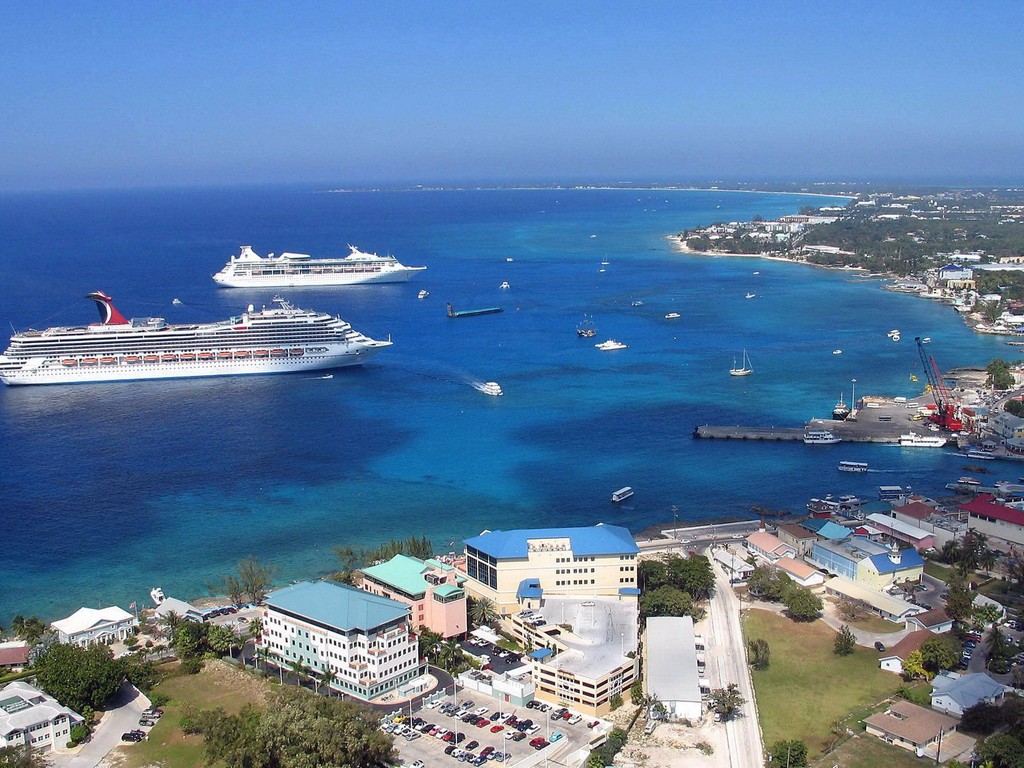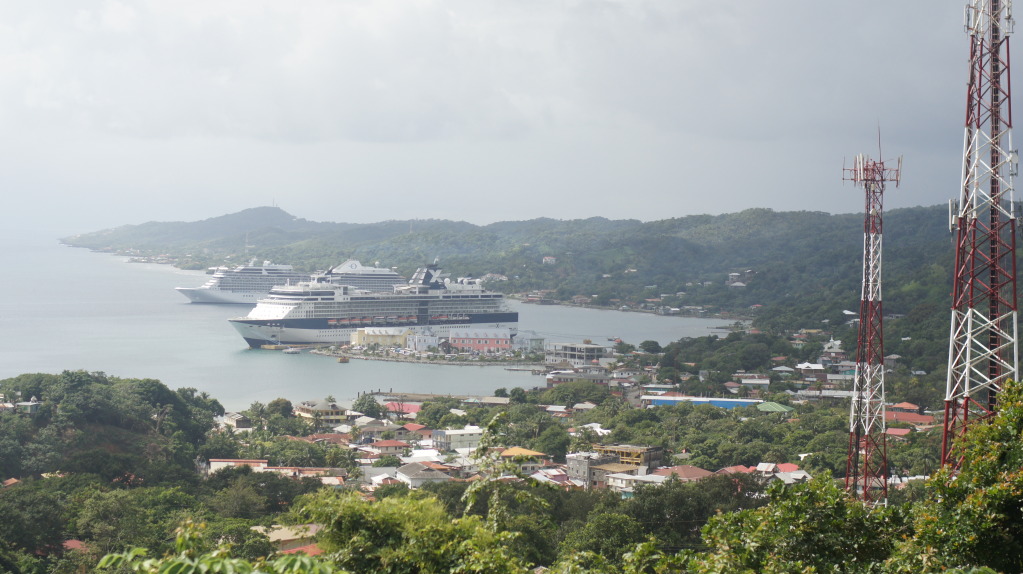

| Cruise Region : Panama Canal, Europe |
| Company : Norwegian Cruise Lines |
| Ship : Norwegian Jade |
| Journey Start : Mon 26 Jan 2026 |
| Journey End : Fri 06 Feb 2026 |
| Count Nights : 11 nights |
| Day | Port | Date | Arrival | Departure |
|---|---|---|---|---|
| 1 | Falmouth, UK / Great Britain | Mon 26 Jan | 23:59 | |
| 2 | Panama Canal / Panama | Tue 27 Jan | ||
| 3 | Cartagena Bolivar / Colombia | Wed 28 Jan | 10:00 | 19:00 |
| 5 | Ocho Rios / Jamaica | Fri 30 Jan | 07:00 | 16:00 |
| 6 | Grand Cayman / Cayman Islands | Sat 31 Jan | 07:00 | 16:00 |
| 7 | Cocksen Hole / Honduras | Sun 01 Feb | 10:30 | 18:00 |
| 8 | Harvest Cay / Belize | Mon 02 Feb | 08:00 | 17:00 |
| 9 | Costa Maya / Mexico | Tue 03 Feb | 08:00 | 17:00 |
| 10 | Cozumel / Mexico | Wed 04 Feb | 08:00 | 18:00 |
| 12 | Galveston / USA | Fri 06 Feb | 08:00 |
Accommodation in a cabin of the selected category during the entire cruise (TV, telephone, shower/bath, hairdryer, air conditioning).
All-inclusive meals, excluding alcoholic beverages under the Freestyle program - free meal time.
Order food to your cabin 24 hours (additional charges apply for delivery between 00:00 and 05:00).
Set for making tea and coffee in the cabin.
Coffee, tea, water and iced tea during breakfast, lunch and dinner.
All entertainment on board (evening shows, nightclubs, live music, etc.).
Sports activities (table tennis, basketball, tennis and golf)
Participation of children in Children's clubs.
Fitness center, sports court, jogging track, swimming pools and jacuzzi.
Port fees, taxes and taxes.
For guests of Suite and Penthouse class cabins (in addition to all of the above):
Butler and concierge service.
Unpacking luggage on the day of check-in.
Champagne, liqueurs, fruits, bottled water and soda drinks (only for guests of Garden Villas and Owner`s Suites)
Champagne, bottled water and fruit on planting day.
Food delivery to the cabin 24 hours.
Minibar and Espresso/Cappuccino machine.
Pillow menu.
Bathrobe and slippers.
Priority check-in for the ship.
Escort to your cabin on check-in day.
Private transfer from port to airport (Garden Villas guests only).
Tips for staff (included in the bill and paid at the end of the cruise).
Casino, telephone, internet, video games.
Alcoholic and some non-alcoholic drinks.
Karaoke.
Bowling.
Laundry service.
Booking tables at alternative restaurants.
Registration of entry visas along the route.
Medical insurance.
Non-departure insurance (optional).
Air travel and transfers.
Excursions at ports of call.
Minibar in the cabin.
Personal services on board (SPA, beauty salon, laundry).


The Panama Canal is an artificial 82 km (51 mi) waterway in Panama that connects the Atlantic Ocean with the Pacific Ocean. The canal cuts across the Isthmus of Panama and is a conduit for maritime trade. Canal locks are at each end to lift ships up to Gatun Lake, an artificial lake created to reduce the amount of excavation work required for the canal, 26 m (85 ft) above sea level, and then lower the ships at the other end. The original locks are 34 m (110 ft) wide. A third, wider lane of locks was constructed between September 2007 and May 2016. The expanded canal began commercial operation on June 26, 2016. The new locks allow transit of larger, post-Panamax ships, capable of handling more cargo.
France began work on the canal in 1881, but stopped due to engineering problems and a high worker mortality rate. The United States took over the project in 1904 and opened the canal on August 15, 1914. One of the largest and most difficult engineering projects ever undertaken, the Panama Canal shortcut greatly reduced the time for ships to travel between the Atlantic and Pacific Oceans, enabling them to avoid the lengthy, hazardous Cape Horn route around the southernmost tip of South America via the Drake Passage or Strait of Magellan.
Colombia, France, and later the United States controlled the territory surrounding the canal during construction. The US continued to control the canal and surrounding Panama Canal Zone until the 1977 Torrijos–Carter Treatiesprovided for handover to Panama. After a period of joint American–Panamanian control, in 1999, the canal was taken over by the Panamanian government. It is now managed and operated by the government-owned Panama Canal Authority.

The city of Cartagena, known in the colonial era as Cartagena de Indias, is a major port founded in 1533, located on the northern coast of Colombia in the Caribbean Coast Region. It was strategically located between the Magdalena and Sinú rivers and became the main port for trade between Spain and its overseas empire, establishing its importance by the early 1540s. During the colonial era it was a key port for the export of Peruvian silver to Spain and for the import of enslaved Africans under the asiento system. It was defensible against pirate attacks in the Caribbean. It is the capital of the Bolívar Department, and had a population 971,592 as of 2016. It is the fifth-largest city in Colombia and the second largest in the region, after Barranquilla. The urban area of Cartagena is also the fifth-largest urban area in the country. Economic activities include the maritime and petrochemicals industries, as well as tourism.
The city was founded on June 1, 1533, and named after Cartagena, Spain, settlement in the region around Cartagena Bay by various indigenous people dates back to 4000 BC. During the Spanish colonial period Cartagena served a key role in administration and expansion of the Spanish empire. It was a center of political, ecclesiastical, and economic activity. In 1984, Cartagena's colonial walled city and fortress were designated a UNESCO World Heritage Site.

Ocho Rios (Spanish for "Eight Rivers") is a town in the parish of Saint Ann on the north coast of Jamaica. Just outside the city, travelers and residents can visit Columbus Park, where Columbus supposedly first came on land, and see maritime artifacts and Spanish colonial buildings.
It was once a fishing village but now caters to tourists.

Гранд Кайман — самый большой из трех островов входящих в Каймановы острова, которые юридически относятся к Великобритании. Именно на Гранд Каймане расположилась столица — Джорджтаун. Сам по себе остров это риф, высота которого достигает 24 метров. Вода у побережья — удивительно прозрачная, это связано с тем, что на острове нет ни одной реки. Посетив остров, Вы получите возможность увидеть место, где выращивают зеленых морских черепах, эта ферма расположена в округе Уэст Бей. Каймановы острова прославились своей необыкновенной красотой подводного плавания. Но в полной мере понять красоту этого места можно лишь посетив его.




Cozumel is an island and municipality in the Caribbean Sea off the eastern coast of Mexico's Yucatán Peninsula, opposite Playa del Carmen, and close to the Yucatán Channel. The municipality is part of the state of Quintana Roo, Mexico.
The economy of Cozumel is based on tourism, with visitors able to benefit from the island's balnearios, scuba diving, and snorkeling. The main town on the island is San Miguel de Cozumel.

Galveston is a coastal resort city and port off the southeast coast on Galveston Islandand Pelican Island in the American State of Texas. The community of 209.3 square miles (542 km2), with an estimated population of 50,180 in 2015, is the county seat of surrounding Galveston County and second-largest municipality in the county. It is also within the Houston–The Woodlands–Sugar Land metropolitan area at its southern end on the northwestern coast of the Gulf of Mexico.
Galveston, or Galvez' town, was named after the Spanish military and political leader in the 18th century: Bernardo de Gálvez y Madrid, Count of Gálvez (1746-1786), who was born in Macharaviaya, Málaga, in the Kingdom of Spain. Galveston's first European settlements on the Galveston Island were built around 1816 by French pirate Louis-Michel Aury to help the fledgling Republic of Mexico fight for independence from Spain, along with other colonies in the Western Hemisphere of the Americas in Central and South America in the 1810s and 1820s. The Port of Galveston was established in 1825 by the Congress of Mexico following its independence from Spain. The city was the main port for the fledging Texas Navy during the Texas Revolution of 1836, and later served temporarily as the new national capital of the now independent Republic of Texas.
During the 19th century, Galveston became a major U.S. commercial center and one of the largest ports in the United States. It was for a time, Texas' largest city, known as the "Queen City of the Gulf". It was devastated by the unexpected surprising Galveston Hurricane of 1900, whose effects included massive flooding and a storm surge which almost completely destroyed and wiped out the town. The natural disaster on the exposed barrier island is still ranked today as the deadliest in United States history, with an estimated death toll of 6,000 to 12,000 people. The city subsequently reemerged during the Prohibition era of 1919-1933 as a leading tourist hub and a center of illegal gambling nicknamed the Free State of Galveston until this era ended in the 1950s with subsequent other economic and social development.
Much of Galveston's economy is centered in the tourism, health care, shipping, and financial industries. The 84-acre (34 ha) University of Texas Medical Branch campus with an enrollment of more than 2,500 students is a major economic force of the city. Galveston is home to six historic districts containing one of the largest and historically significant collections of 19th-century buildings in the U.S., with over 60 structures listed on the National Register of Historic Places, maintained by the National Park Service in the United States Department of the Interior.